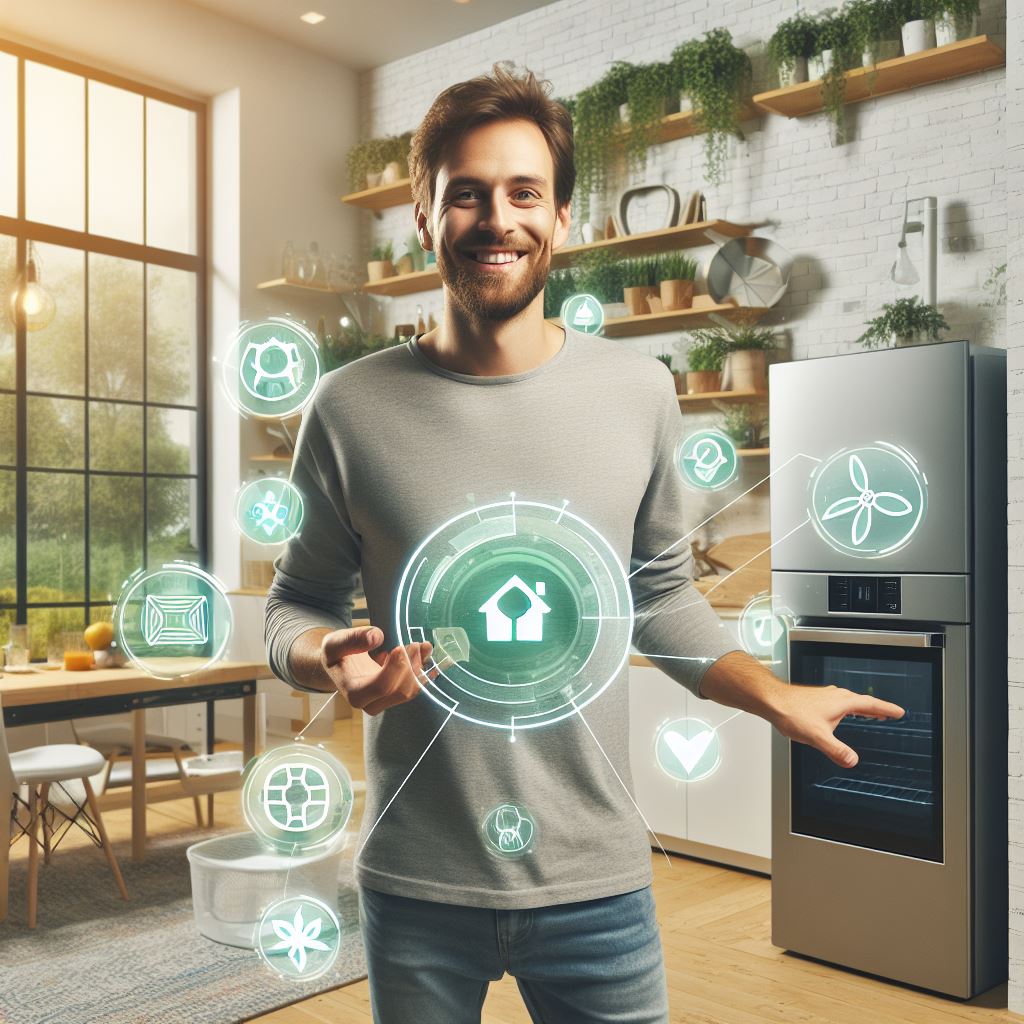Smart Homes for Sustainability
Last Updated on March 6, 2024
Introduction
A. Definition of Smart Homes for Sustainability
Smart homes integrate technology to optimize energy use, reduce waste, and enhance living comfort.
They employ sensors, automation, and connectivity to monitor and control various systems.
B. Growing Interest in Sustainable Living
- Environmental Concerns: Increased awareness of climate change and its impact drives individuals to adopt sustainable practices.
- Cost Savings: Sustainable homes reduce utility bills through energy-efficient appliances and renewable energy sources.
- Health Benefits: Green building materials and indoor air quality monitoring promote healthier living environments.
- Technology Advancements: Rapid advancements in smart home technology make sustainable living more accessible and convenient.
- Government Initiatives: Incentives and regulations encourage sustainable home construction and renovations.
Essentially, the concept of smart homes for sustainability aligns with the global trend towards environmental consciousness and efficient resource utilization.
Benefits of Smart Homes for Sustainability
A. Advantages of Smart Homes for Sustainability
Smart Homes offer numerous benefits for sustainability, particularly in the areas of energy efficiency, water conservation, and the reduction of carbon footprint.
- Energy efficiency: Energy efficiency is a major advantage of smart homes.
These homes utilize advanced technologies and automation systems to minimize energy consumption. - Use of smart thermostats: The use of smart thermostats is one way smart homes achieve energy efficiency.
These devices optimize temperature settings based on occupancy and preferences, resulting in reduced energy usage. - Integration of renewable energy sources: Integration of renewable energy sources is another significant benefit of smart homes.
They enable homeowners to harness solar or wind energy, reducing reliance on fossil fuels. - Water conservation: Water conservation is a crucial aspect of sustainability, and smart homes contribute to this goal as well.
- Smart irrigation systems: Smart irrigation systems are used in smart homes to minimize water usage by monitoring soil moisture levels and adjusting irrigation accordingly.
- Monitoring and control of water usage: Monitoring and control of water usage is another feature offered by smart homes.
This allows homeowners to track water consumption and receive alerts for potential leaks or excessive usage. - Reduced carbon footprint: Reducing carbon footprint is a key objective in sustainability efforts, and smart homes play a vital role in achieving this goal.
- Smart appliances and lighting: Smart appliances and lighting are commonly used in smart homes, as they are more energy-efficient and can be controlled remotely.
- Efficient waste management systems: Efficient waste management systems are another aspect that contributes to reducing carbon footprint in smart homes.
Smart bins can sort and compact waste, optimizing waste disposal processes.
B. Other benefits
In addition to energy efficiency, water conservation, and reduced carbon footprint, smart homes offer several other advantages for sustainability.
Reduced costs are an attractive benefit of smart homes.
Energy-efficient systems lead to lower utility bills, and proper water management results in reduced water expenses.
Improved comfort and convenience are also significant advantages of smart homes.
Automation systems allow for customized settings and remote control of various home functions.
Enhanced safety and security features are additional benefits of smart homes.
They include advanced surveillance systems, smart locks, and motion detectors, ensuring the protection of both occupants and property.
Smart homes also contribute to the overall well-being of individuals. Features like air quality monitoring systems ensure a healthier living environment.
In fact, smart homes offer numerous benefits for sustainability.
From energy efficiency and water conservation to reduced carbon footprint, these homes utilize advanced technologies to promote eco-friendly living.
With their ability to optimize resource usage, smart homes play a crucial role in creating a more sustainable future.
Read: Eco Materials: Real Estate’s Future
Smart Home Technologies for Sustainability
Smart homes have become a popular choice for environmentally conscious individuals.
These homes utilize innovative technologies that promote sustainability and reduce energy consumption.
A. Energy Management Systems
Energy management systems are a crucial component of smart homes, allowing homeowners to monitor and control their energy usage.
These systems provide real-time information on energy consumption, helping homeowners make informed decisions to reduce their carbon footprint.
By analyzing energy usage patterns, these systems can suggest ways to optimize energy consumption and reduce waste.
B. Remote Control of Energy Usage
Smart homes allow homeowners to remotely control and monitor their energy usage.
Using mobile apps or voice commands, homeowners can turn off lights, adjust thermostats, and manage their energy consumption even when away from home.
This feature prevents unnecessary energy usage and ensures that energy is only used when needed.
C. Optimization of Energy Consumption
Smart home technologies can automatically optimize energy consumption based on predefined preferences and schedules.
For example, the system can adjust the temperature setting based on occupancy patterns to minimize energy waste.
This optimization reduces energy consumption without sacrificing comfort.
D. Water Management Systems
Smart homes also incorporate water management systems to promote sustainable water usage.
These systems include leak detection and prevention mechanisms to avoid water waste.
Efficient water usage tracking allows homeowners to monitor their water consumption and identify areas for improvement.
E. Leak Detection and Prevention
Smart homes utilize sensors and advanced algorithms to detect leaks in the plumbing system.
Upon detection, homeowners receive immediate alerts, allowing them to take prompt action and avoid water damage and waste.
This technology saves water, reduces utility costs, and preserves water resources.
F. Efficient Water Usage Tracking
Smart home technologies enable homeowners to monitor their water consumption in real-time.
Usage data is analyzed to identify opportunities for water conservation and encourage responsible water usage.
By tracking and managing water usage, smart homes play a crucial role in preserving this precious resource.
G. Waste Management Systems
Smart homes address waste management challenges by implementing innovative solutions.
These solutions include smart recycling systems that promote proper waste segregation and recycling practices.
Composting technologies are also integrated, allowing homeowners to convert organic waste into nutrient-rich compost for their gardens.
H. Smart Recycling Solutions
Smart recycling solutions in smart homes automate the recycling process by streamlining waste collection and separation.
By making recycling convenient and efficient, these solutions encourage sustainable waste management practices.
They contribute to reducing landfill waste and conserving resources.
I. Composting Technologies
Composting technologies in smart homes enable homeowners to compost food scraps and garden waste.
These systems accelerate the composting process, producing nutrient-rich compost that can be used to enrich the soil.
By diverting organic waste from landfills, these technologies promote a circular economy and reduce greenhouse gas emissions.
In short, smart home technologies play a crucial role in promoting sustainability.
Energy management systems, water management systems, and waste management systems enable homeowners to reduce their environmental impact and live more consciously.
By embracing these technologies, individuals can contribute to a greener and more sustainable future.
Read: Green Roofs: Are They Worth It?

Case Studies: Smart Homes for Sustainability
Modern technologies have revolutionized the way we live, making our lives more convenient, comfortable, and now, sustainable.
Smart homes equipped with advanced technologies play a crucial role in achieving sustainability and reducing the environmental impact of residential buildings.
In this blog section, we will explore three case studies that demonstrate the effectiveness of smart home technologies in promoting sustainability.
Example 1: Energy-efficient lighting and smart thermostats
Energy-efficient lighting is a crucial component of smart homes for sustainability.
LED bulbs are widely used due to their energy-saving capabilities and long lifespan.
Smart thermostats, on the other hand, regulate heating, ventilation, and air conditioning (HVAC) systems based on occupancy patterns and weather conditions.
These technologies not only provide homeowners with control and convenience but also significantly reduce energy consumption and contribute to cost savings.
Example 2: Smart irrigation and water monitoring
Water scarcity is a pressing issue worldwide, making efficient water management essential.
Smart irrigation systems utilize weather data and soil moisture sensors to determine the optimal watering schedules for lawns and gardens.
By avoiding overwatering and adjusting irrigation based on real-time conditions, these systems reduce water usage and help conserve this precious resource.
Homeowners can rest assured that their landscapes are receiving sufficient water without wasting it.
Example 3: Integrated waste management system
The proper management of waste is a critical aspect of sustainability.
Integrated waste management systems integrate recycling, composting, and waste reduction practices.
Through effective waste segregation and recycling programs, these systems maximize the percentage of waste diverted from landfills.
This approach reduces the burden on landfill space, minimizes greenhouse gas emissions, and promotes a circular economy by transforming waste into valuable resources.
By implementing these smart home technologies, homeowners can actively participate in sustainable practices and contribute to a greener future.
Moreover, these technologies often result in cost savings, making sustainable living more accessible to a wider audience.
Embracing the benefits of energy-efficient lighting, smart irrigation, and integrated waste management not only improves the impact of individual homes but also has a collective positive effect on the environment.
In general, smart homes equipped with sustainability-focused technologies offer significant advantages.
The case studies highlighted in this blog section demonstrate the positive impact of energy-efficient lighting, smart irrigation, and integrated waste management systems.
By adopting these technologies, homeowners can minimize their ecological footprint, conserve resources, and contribute to a more sustainable future for all.
So, let’s embrace the power of smart homes and pave the way towards a greener and more sustainable world.
Read: Net-Zero Living: A US Overview
Challenges and Considerations
A. The Cost of Implementing Smart Home Technologies
The initial investment in smart home technologies can be high, deterring some homeowners.
Installation costs, including labor and equipment, can add significantly to the overall expense.
Ongoing maintenance and upgrades may be required, adding to the long-term cost of implementation.
B. Privacy and Security Concerns
Connectivity and data collection in smart homes raise privacy concerns for many homeowners.
Smart devices collecting personal information create potential vulnerabilities and expose homeowners to security risks.
Unauthorized access to smart home systems can compromise not only privacy but also the physical security of residents.
C. User Education and Adoption
Many homeowners are unfamiliar with smart home technologies and may be resistant to change.
Education and training programs are necessary to help users understand and use smart home systems effectively.
User adoption can be challenging due to the learning curve associated with new technology.
Continuous support and assistance are crucial to ensure homeowners fully benefit from the smart home technologies.
D. Compatibility and Interoperability Issues
The lack of standardization in smart home technologies can lead to compatibility issues.
Ensuring that different smart devices from various manufacturers can work together seamlessly is a complex task.
Interoperability problems can limit the functionality and overall efficiency of a smart home system.
Regular updates and collaboration among manufacturers are essential to address these compatibility challenges.
While smart homes offer numerous benefits for sustainability, challenges and considerations must be addressed for successful implementation.
The cost of implementing smart home technologies, privacy and security concerns, user education and adoption, and compatibility and interoperability issues are important considerations.
By understanding and resolving these challenges, we can move closer to the widespread adoption of smart homes and achieve a more sustainable future.
Read: Solar Power in Real Estate Today
Future Outlook for Smart Homes and Sustainability
The future outlook for smart homes and sustainability is promising, with several trends and advancements driving the growth of this market:
A. Growing market for smart home technologies
Increased consumer demand for convenience, energy efficiency, and security is fueling the growth of smart home technologies.
Smart devices and appliances such as thermostats, lighting systems, and security cameras are becoming more affordable and accessible.
Advancements in wireless connectivity and IoT technology are making it easier to integrate various smart devices in homes.
The global market for smart homes is projected to reach billions of dollars in the coming years.
B. Integration with smart city initiatives
Smart homes are an essential component of the broader smart city concept, where interconnected devices and systems improve overall sustainability.
By integrating smart home technologies with other city infrastructure, such as smart grids and transportation, energy consumption can be optimized.
Smart homes can actively communicate with the grid, optimizing energy usage based on overall demand and renewable energy availability.
This integration enhances the efficiency of urban systems, reducing environmental impact and contributing to sustainable development.
C. Advancements in artificial intelligence and machine learning
Artificial intelligence (AI) and machine learning are revolutionizing the capabilities of smart home technologies.
Smart homes can now learn inhabitants’ patterns, preferences, and adjust settings to optimize energy consumption.
AI-powered virtual assistants, like Amazon’s Alexa or Google Assistant, can control various smart devices and provide energy-saving suggestions.
The combination of AI and machine learning in smart homes allows for continuous improvement and adaptation to inhabitants’ needs.
In a nutshell, the future of smart homes and sustainability is bright.
With the growing market for smart home technologies, integration with smart city initiatives, and advancements in artificial intelligence and machine learning, smart homes will play a crucial role in creating more sustainable and energy-efficient living environments.
Conclusion
Smart homes offer numerous benefits for sustainability in terms of energy efficiency, convenience, and cost-saving.
They allow homeowners to conserve resources and reduce their carbon footprint.
By automating various systems, smart homes optimize energy consumption and promote a greener lifestyle.
Additionally, smart homes provide a comfortable and convenient living experience by integrating different devices and allowing remote control and monitoring.
They can also help save money in the long run through lower utility bills.
Overall, choosing sustainable smart home solutions is not only beneficial for the environment but also for the homeowners themselves.
A. Recap of the benefits of smart homes for sustainability
To recap, smart homes offer a range of benefits for sustainability.
They enable homeowners to reduce energy consumption, leading to reduced carbon emissions and a smaller environmental footprint.
By automating various systems, smart homes optimize energy efficiency and promote a greener lifestyle.
Moreover, they provide convenience and comfort through integrated devices and remote control capabilities.
With the ability to monitor and control energy usage, homeowners can save on utility bills and reduce their overall expenses.
Sustainable smart home solutions are a win-win for both the environment and the individuals living in them.
B. Encouragement for readers to explore sustainable smart home solutions
We encourage readers to explore sustainable smart home solutions and embrace the numerous advantages they bring.
By investing in energy-efficient appliances, smart thermostats, and automated lighting systems, homeowners can significantly reduce their environmental impact and contribute to a sustainable future.
It is essential to research and choose products that meet sustainability standards and align with personal preferences.
By adopting sustainable smart home technologies, individuals can play an active role in conserving resources and reducing energy waste.
Let’s make a conscious choice towards a greener and more sustainable lifestyle.


